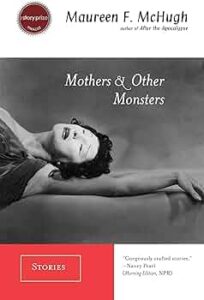How can it be that there are only two collections of stories by Maureen F. McHugh? And now I have read them both. She has published two more novels that I haven’t read yet, but after that I have to hope for a new book, which as far as I can tell has not happened for more than a dozen years. Perhaps quantity is the price paid for quality, but I wish there were many more McHugh books to read and enjoy, to read and think about for years later, or even to read and be deeply unsettled about, because some of these stories are in fact deeply unsettling. And then there are stories that are just going on about school and families and dogs and along comes a sentence like “[My dog] was acting that way because Tye was a werewolf, although he wasn’t really, not yet.” It’s followed by “I didn’t know Tye was a werewolf, because he didn’t tell me that for years and years.” And then, matter-of-factly, as kids are wont to do, “In movies, dogs are afraid of werewolves, but that’s not true.” (p. 135) The story is “Laika Comes Back Safe,” and it’s about a girl who really wishes Laika had come back safe, and the boy who becomes her best friend as they grow into teenagers. It’s about dysfunctional families, and trying to make sense of the world when fights and craziness are what you know best. It’s beautiful, and heartbreaking, and Tye does eventually tell her about being a werewolf.
Mothers and Other Monsters has stories that begin with sentences like “In the afterlife, Rachel lived alone.” That’s “Ancestor Money,” which mixes East Asia and what could be East Kenticky so seamlessly that it makes perfect sense, though of course practically everyone in it is dead already. It has a story in the form of an interview about what happens when Baby Boomers get age-reversing treatments before anyone else, and that crosses with an AIDS-like disease, told mostly by an actual teenager from that time. It has a story, “Eight-Legged Story” that takes the shape of a traditional Chinese essay form. Each part
presents an example from an earlier classic. Together, the parts are seen as the argument. The conclusion is assumed to be apparent to the reader. It is implicit rather than explicit. It’s not better or worse than argument and conclusion, it’s different. It is more like a story. This is not an eight-legged essay. If it were, I would use examples from the classic literature. Once upon a time there was a girl named Cinderella. Once upon a time there was a girl named Snow White. (p. 180)
The book has the quick punch of “Wicked,” the determinedly unexplained strangeness of “The Beast” and the chilling but humane what-if of “The Lincoln Train,” which won a Hugo in 1996 for best short story. Mothers and Other Monsters also has two stories that later became McHugh novels: “Nekropolis,” which kept the same title in its novel version (I haven’t read it), and “The Cost to be Wise,” which became Mission Child. The story in this collection only covers the first chapter of Mission Child, life along the world’s arctic frontier and the devastating raid that ends the protagonist’s childhood. For the novel, McHugh streamlined the actions and the characters a bit, so this version seemed fuller to me. And while “The Cost to be Wise” is complete with a solid ending, I can easily see how McHugh realized there was more to her lead character’s story and decided to explore the rest of the world.
I was talking about After the Apocalypse with a friend, and they said that maybe McHugh was too close to literary fiction to have amassed a big following in science fiction. In an interview that’s part of the appended “Reading Group” material at the end of the book, McHugh says
Science fiction has been really good to me, but I am conscious of having disappointed a lot of readers. People complain that I write stories that … could be about today if you took the speculative element out.
But outside the field, I think I’m seen as a little precious. I write science fictional stories about moms. Kind of a niche. The way feminist writing is seen as a niche. I feel that for years my stories weren’t read outside the field. So inside the field I was seen as not science fictional enough and outside the field I was too science fictional.
Nearly 20 years after she made those remarks, I would hope that views both inside and outside the field of science fiction might have become more accommodating to what McHugh does, but I can’t say for sure. Very few of the stories in this collection feel dated, even though they were originally published as much as 32 years ago. McHugh’s work has probably suffered in popularity for not being trendy; maybe now it can gain from being timeless.

